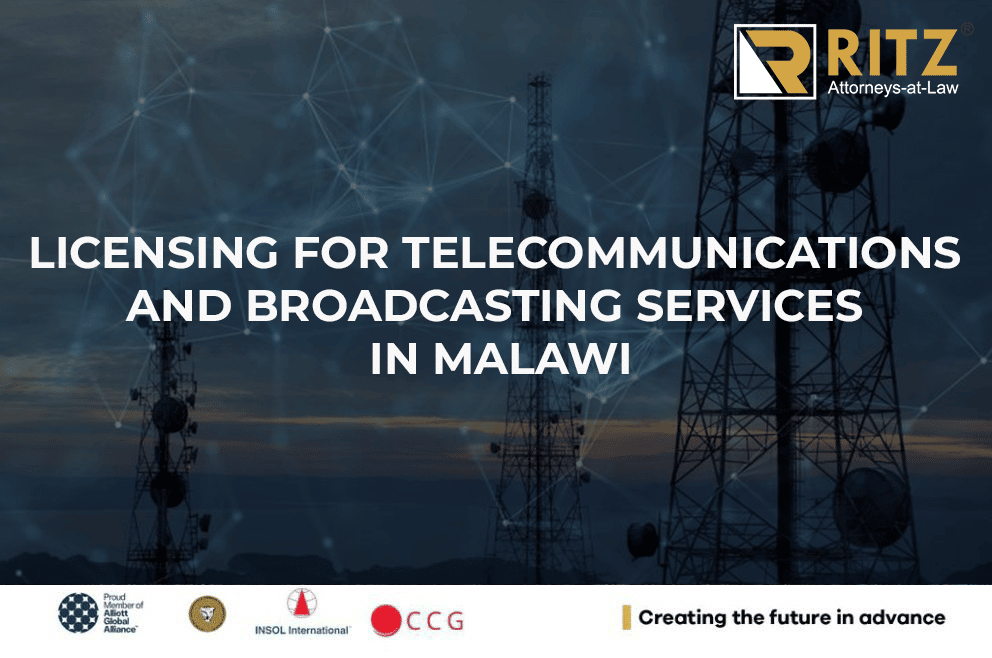Governing Law
The provision of Telecommunications and Broadcasting Services in Malawi is governed by the Communication Act, of 2016. The law requires that every person/entity providing electronic communications services in Malawi should only do so after they have been duly licensed. The Malawi Communications Regulatory Authority (MACRA) is the body empowered to issue licenses for the provision of Telecommunications and Broadcasting services in Malawi. The Communications Act is supplemented by the Communications (Telecommunications and Broadcasting Licensing) Regulations, 2016 which sets out the details of the types of licenses that may be issued, and the procedures to be followed in the granting of the licenses.
2. Qualifications to Hold a Telecommunications and Broadcasting Licence
To hold a license in the provision of Telecommunications and Broadcasting services in Malawi you must meet the following eligibility criteria:
2.1. Registration as a Business Entity
You must be duly registered under the Laws of Malawi. This can take several forms including registration as a sole trader, where one acquires a business certificate; registration as a business partnership; and registration as a company incorporated in accordance with the specifications of the Companies Act 2013.
2.2. Local Ownership.
The Communications Act also requires that an Applicant for a license should maintain local ownership of at least twenty percent. This has varying implications for the various forms of business organizations that may apply for a license as follows:
- Sole trader– To meet the requirement, the owner must be Malawian.
- Partnership– The stake of the Malawian partners in the partnership should amount to at least twenty percent.
- Company – Malawian shareholders in the company must hold a minimum of twenty percent of the shares.
2.3. Financial Capability
The provision of telecommunication and broadcasting services involves significant capital and technical investment. Thus, you will be required to satisfy MACRA that you possess the required capital and technical resources to allow you to use your license and comply with all its conditions.
3. Types of Licences that may be issued
Under the Communications (Telecommunications and Broadcasting Licensing) Regulations the following license can be issued:
- Network Facilities Licence- This includes the provision of towers, cables, ducts, VSAT satellite hubs, Satellite Earth station systems, Transmission poles, public payphone facilities, and Landing Points Mobile Communication Systems.
- Network Services Licence- This includes the provision of internet services, PSTN/ PLMN services, space services, segment services
- application Service Licence- This includes the provision of Internet Services provided to customers, payphone services, virtual mobile providers, public cellular services, IP telephones, Public payphone services, and public switched data services. This provision may be with or without a network facilities and services license
- Broadcasting (Content) Service Licence- This includes the provision of satellite broadcasting, terrestrial television, radio broadcasting, and other electronic media. The provision of a Broadcasting (Content) Service Licence must be accompanied by an application for a frequency spectrum license that specifies the specific frequency at which you will be allowed to broadcast your content.
4. Associated Costs
As pointed out already, setting up as a service provider in telecommunications or broadcasting services involves substantial costs. Apart from the capital requirements needed to roll out operations, one also must prepare to pay some significant application
fees and levies upon and after application for the license. A detailed schedule of all fixed fees and levies can be found here (add a link to schedule A).
5. Time Frames for Processing of Licenses
Once you have applied MACRA is required to give you a response within 60 days. If successful MACRA will invite you for final negotiations of your license conditions. The license is thereafter issued after you have paid the initial fees per the schedule provided and the license has been published in the Gazette. The license entitles you to officially set up your operations as a telecommunications or broadcasting services provider. The Act requires MACRA to notify you in writing when your application for a license is unsuccessful. The communication must contain the reasons for the rejection. This enables you to pursue remedies provide under the Act or indeed to correct defects in your application to reapply for the license.
6. Conclusion
The provision of telecommunications and broadcasting services in Malawi requires significant financial and technical investment. It is therefore imperative that you familiarize yourself with the type of license you will need to operate in the sector and the legal requirements that would be involved in securing that license.




